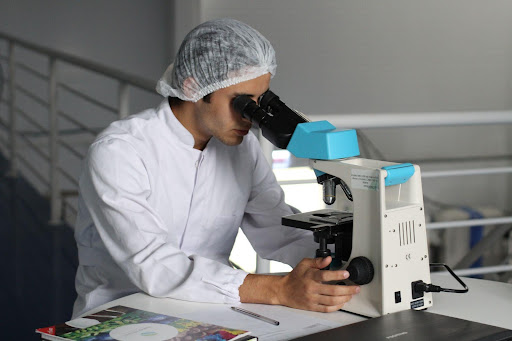
And it’s about time!
From improving various administrative processes to enhancing overall patient care and more, AI technology is forecasted to revolutionize the healthcare system.
Think of all the exciting possibilities.
Current debate reveals that Artificial Intelligence technology can perform as well or better than human beings. How will AI impact the healthcare profession? Will it be AI vs. Doctors? What will AI look like in future years to come?
Ultimately, the road to incorporating AI into all areas of healthcare is a long and windy one. For now, let’s take a look at what’s happening in today’s world.
Keep reading to learn more about the benefits of artificial Intelligence in Healthcare!
Related: What Is A Hospitalist?
What is Artificial Intelligence?
Relative to healthcare, Artificial Intelligence (AI) describes the adaptation of machine learning (ML) and other cognitive technologies to the medical field.
In addition to machine learning, AI also entails the application of deep learning (DL) and natural language processing (NLP) to support medical professionals by finding solutions to problems at faster rates.
Are you a healthcare worker wanting to improve your quality of life? Achieve balance and success with OptiMed’s partnership professional development track.
10 Benefits of Using Artificial Intelligence in Healthcare

Artificial Intelligence brings considerable benefits to the medical sector.
Logistically, AI helps identify patterns and advanced insights in health by analyzing obscene amounts of stored data consisting of research trials, images, and claims. Along with healthcare professionals, AI can also help patients and everyday people by improving the quality of care, customizing healthcare plans, and more!
Here are the top ways that AI is revolutionizing healthcare for the better!
Artificial Intelligence provides valuable assistance to emergency medical staff
For medical emergencies, Artificial Intelligence can accelerate the time it takes healthcare professionals to analyze health issues and identify diagnoses, which is incredibly impactful for ambulance scenarios. In the form of machine learning, AI can examine both nonverbal and verbal indicators to form a diagnosis remotely.
AI can decrease developmental costs for medicines
In the form of supercomputers, AI can analyze molecular structures’ data to forecast effective medicinal treatments for diseases.
For instance, a drug discovery algorithm called AtomNet successfully implemented convolutional neural networks to anticipate the binding of molecules to specific proteins through the analysis of clues from thousands of protein formations and millions of experimental measurements. The convolutional neural networks established a practical and secure drug candidate from the database, ultimately decreasing the price of developing medicine.
AI builds complex platforms for drug discovery
Recursion Pharmaceuticals applied Artificial Intelligence algorithms to pinpoint novel drug applications by tracking their mechanisms of action and toxic potential. The ability to trace this kind of data led to the company creating a drug discovery platform worth $12.9 million.
Machine learning tools like these reduce the hazard of human bias by crafting insights from data that is too advanced for the human mind.
Artificial Intelligence supports medical imaging analysis
By enhancing and accelerating the review process of medical images and scans, AI helps medical professionals like radiologists and cardiologists identify and prioritize severe medical cases. Meanwhile, AI technology also prevents mistakes in analyzing electronic health records and effectively establishes findings.
In the case of a clinical study, AI accelerates the process of reviewing extensive amounts of essential images and data and also double-checks results by cross-referencing conclusions with other studies.
AI analyzes unstructured data
With new additions and technological advancements, it can be challenging for healthcare professionals to keep up.
Through machine learning, Artificial Technology enables fast and accurate medical answers for medical professionals because of the rapid scanning of biomedical data and electronic health records (EHRs).
General practices for medical record storage consist of unclear and unstructured data, which slow down the interpreting process. AI targets this flaw by collecting and storing data and contributes tailored solutions and medicines to help both patients and healthcare professionals.
AI accelerates the discovery and development of genetic medicine
Artificial Intelligence can also uncover and create powerful medicine.
Genetic diseases relate to modified molecular phenotypes, like the binding of molecules. AI can forecast cases of genetic diseases through the data collection of relevant compounds and biomarkers.
For example, an AI system called Deep Genomics works to develop new strategies to fix the repercussions of genetic mutations and further cultivate personalized therapies. Overall, AI reduces the high costs of rare diseases, helping patients and clinicians.
Artificial Intelligence can forecast kidney disease
Frequently, acute kidney injury (AKI) can be problematic for healthcare professionals to determine, resulting in the fast onset of the disease and the risk of a life-threatening situation. The most effective ways to battle kidney disease are early detection and effective treatment.
Machine learning (ML) tools, like one developed by the Department of Veterans Affairs and DeepMind Health, have been shown to forecast AKI within 48 hours.
AI contributes to cancer research and treatment, especially in radiation therapy
With occasional occurrences, radiation therapy may fail to have a modern database for electronic health records causing increased difficulty in cancer treatments. AI has been used to help professionals form accurate decisions for patient treatment by collecting advanced medical data and arranging extensive oncology reports, findings, and imaging.
Artificial Intelligence uses data collected for predictive analytics
AI can transform electronic health records (EHRs) into predictive, technology-driven tools that allow for greater efficiency, time management, resource preservation, and quality care. Machine learning (ML) and natural language processing (NLP) can analyze entire medical histories in real-time and connect chronic ailments, symptoms, and genetic predispositions and illnesses. AI can forecast and treat a disease before it’s too late.
Artificial Intelligence supports health equity
Considering human error, AI can deliver the best health outcomes by safeguarding equity in data and clinical studies and improving the design of healthcare systems and technologies. AI and machine learning algorithms can be taught to limit or extinguish differences in health results based on gender, ethnicity, or race.
Artificial Intelligence must be applied responsibly to ensure the algorithms are precise and fair.
Related: The Mind-Body Connection
The Further Growth of Artificial Intelligence in Healthcare

Evidence has illustrated the countless benefits of applying Artificial Intelligence in healthcare practices.
By helping healthcare providers, enhancing clinician workflows and operations, accelerating repetitive tasks and data collection, and unearthing new therapies and treatments, AI is revolutionizing healthcare systems and improving the lives of researchers, clinicians, and patients.
Are you overworked and overwhelmed? Contact OptiMed to receive accommodating services that help you succeed to your fullest potential!
Conclusion
Despite the application of Artificial Intelligence in the healthcare sector showcasing powerful advancements in patient care, data collection, and diagnosis predictions, it is only the beginning.
In healthcare, obstacles stand ahead for AI, including health equity, public distrust for machine learning results, and strict requirements. However, the implementation of AI in the medical sector has already reaped the rewards for stakeholders.
As of now, AI in healthcare forecasts a bright and hopeful future.
Related: Moral Injury In Health Care Workers
